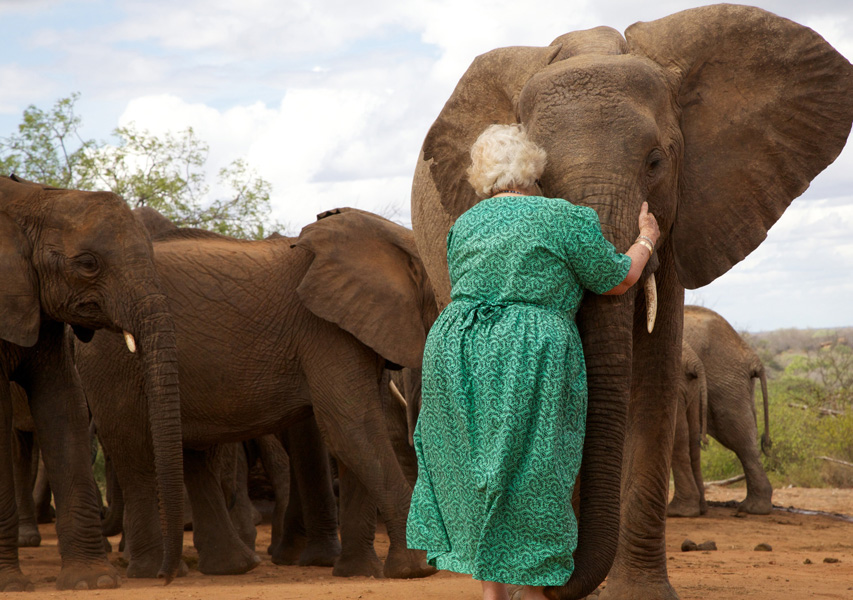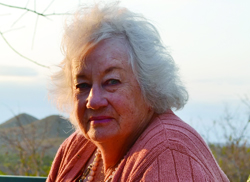
An elephant hurled her on to rocks, crushing her bones; not only did she live to tell the tale but she has dedicated her life to rescuing, rehabilitating and reintegrating elephants and rhinos. A fourth-generation Kenya-born Briton, Dr. Dame Daphne Sheldrick adopted her first orphaned animal, a bushbuck, when she was only three years old. “My parents always told me that wild animals never belong. They are on loan, and if you love them, you will set them free. When the bushbuck felt the call of the wild, it broke my heart.” This background set the stage for her lifelong love for animals. Sheldrick founded the David Sheldrick Wildlife Trust (DSWT) in 1977 in memory of her husband, a fellow conservationist.
Through the Trust she started a pioneering orphans’ project which has successfully become world renowned in the rescue, rehabilitation and reintegration of elephants and rhinos. After finishing high school, Sheldrick moved to Tsavo National Park where met her husband, a senior warden at the park. He had built the park, the size of Wales or Michigan, but faced challenges from bureaucracy in a changing regime, crooked scientists, poachers, ivory cartels and logistical obstacles of living in the remote bush. Sheldrick describes her husband and co-conservationist in colourful terms: “He was good at everything. A wonderful shot, the youngest major in the Second World War King’s African Rifles… a man of impeccable integrity.” Sheldrick was a capable and devoted partner to her husband, having learned valuable survival skills from her mother. He wrote of her: “She was very artistic; she sewed all our clothes and knitted our jerseys. She was an excellent cook. And she always loved flowers and gardens…” She turned the solitary outpost into a warm and cosy home. Together, they reared orphans of misfortune…elephants, black rhinos, buffalo, zebras, elands, kudus, impalas, duikers, reedbuck, dik-diks, warthogs, civets, mongooses and birds. This hands on experience, coupled with her husband’s quarter-century tutelage, endowed Sheldrick with a rock-solid foundation of knowledge — more than one could attain in any classroom or laboratory.
The couple derived much joy from the menagerie such that each animal’s death shredded Sheldrick’s heart. The elephants under two years old died because cow milk is lethal to them. The husband-wife team never gave up their trial-and-error quest for the right home-made formula. The missing component was coconut, biologically closest to elephant milk fat. Tragically, when Sheldrick finally created the correct formula after 28 years, her husband was not there to share her joy. He died unexpectedly of a heart attack in 1976 at 56, leaving her and daughters Jill and Angela devastated. She knew she probably would have a long time on her own. “But it was worth it,” she declares.

Widowed and with no means to support herself, the government allowed her to build a small tin house in the Nairobi National Park, where she would work as a volunteer conservationist.
However, “reticent and laid-back”, as she describes herself, Sheldrick had no idea she would be required to raise more elephants, a calling that has involved years of foster-motherhood of elephants and rhinos. The new phase began when the Kenya Wildlife Service (KWS) asked her to nurture an infant elephant at the orphanage. She had to drive through the national park day and night for three hours to bottle-feed the orphan. When other babies arrived, she asked KWS to take them to her house. Meanwhile, her husband’s friends convinced her to create a trust in his memory, which she would chair. They managed to raise some money by showing films and giving talks in clubs and DSWT was born. “We sent a hat around for a few bob here and there,” she recalls.
Today, the Trust has around 200 staff — a level of growth Sheldrick had never imagined. She prefers to have zero orphaned wildlife and yet the Trust’s growth is the sad testament of human greed and cruelty, which has assumed holocaust proportions for elephants and rhinos. Sheldrick describes elephants as “very human”. She explains: “They mirror our development at every stage. Up to three years, the babies need 24-hour tender loving care for their physical, emotional and social growth. When teething, they develop severe diarrhoea that claims many of them.” The octogenarian wakes up at 5:30am. “I like housework, so I dust and clean my house.” By eight, she starts work, going through each orphan’s book to check the morning entry — whether it slept well or had nightmares, the colour of its stool and the like. Baby elephants can be fine one day and dead the next. Sheldrick therefore endeavours to quickly diagnose and remedy situations. She tests blood samples of sick orphans before administering drugs, very much like one does with human children.
You reap what you sow; if you treat people and animals kindly, it comes back to you. People recognise what you do and help you do more. The conservationist has delegated much of the running of the Trust to her daughter, Angela, but remains an active adviser. Compiling and publishing elephant diaries from rangers countrywide enables Sheldrick to virtually keep her finger on the pulse of each pachyderm in her care. She explains that elephants are highly intelligent, and death in their family deeply traumatises them. They mourn just like humans and return periodically to the site of a loved one’s death to pay their respects. Yet they carry on, a philosophy that has comforted Sheldrick in her darkest moments. “I draw emotional stamina from elephants, who suffer tragedy and heartbreak almost daily, but find the courage to turn the page and focus on life after grieving, just as acutely as us humans, and perhaps even more so.”
Sheldrick has trained 50 elephant keepers, who care for the orphans using complex procedures. The keepers, she asserts, probably know more about elephants than any scientist. This is because
“the elephants consider them family, so they behave totally naturally around them. They love them and come back after living in the wild. They bring their babies along to show the keepers.”

Once the orphans are weaned, Sheldrick and her team gradually release them into the Tsavo. Previously, she entrusted repatriated orphans to her old friend, Eleanor — a Samburu matriarch,
whom she raised in the 1960s. Eleanor and Sheldrick maintained contact for over 30 years until they lost touch, but Eleanor was sighted in 2006. Once during a visit to Tsavo, Sheldrick mistook another elephant for Eleanor. The cow walked towards her, appearing friendly, Sheldrick reached out to touch her ear. Startled, the elephant flicked her with her trunk and sent Daphne flying into a pile of rocks, instantly shattering her legs. She realised too late that this was not Eleanor. Months of treatment enabled her to regain use of her limbs. Despite the excruciating encounter, Sheldrick is happy to be alive. Ironically, the animal she now fears the most is her beloved elephant, although her love and understanding of elephants surpasses any fear.
She believes she has a duty to share her life-long knowledge from studying elephants and their habitats, hence the memoirs, articles and videos she has published. She is known for her devotion
and toil, for which she receives regular invitations to award ceremonies and speaking engagements. Sheldrick loves being§ in the bush. The naturalist is never lonely among birds and other wildlife. “The one animal I’m not that comfortable with is lots of humans,” she says. “As for the accolades, I find them a bit of a pain, honestly, I don’t like travelling overseas.” However, she cherishes the Moran of the Burning Spear presidential award, which meant a lot to her because it came from Kenyan people. The British-passport-holder has always regarded Kenya as her home and with the new Constitution in place, she is contemplating dual citizenship. The matriarch has taught her daughters and four grandchildren that; “you reap what you sow; if you treat people and animals kindly, it comes back to you. People recognise what you do and help you do more.”
Sheldrick has successfully reared over 150 elephants, excluding 100, that arrived too far gone to survive. The Trust’s mobile veterinary units have helped save 800 elephants. With worldwide
public support, the DSWT has saved almost 1,000 elephants, which would most certainly have died. She fondly remembers Kenya’s first President Jomo Kenyatta, who, in 1970, took stern action
against poaching, declaring bull elephant Ahmed protected by presidential decree. Anyone who tried to kill Ahmed risked life imprisonment or death.
